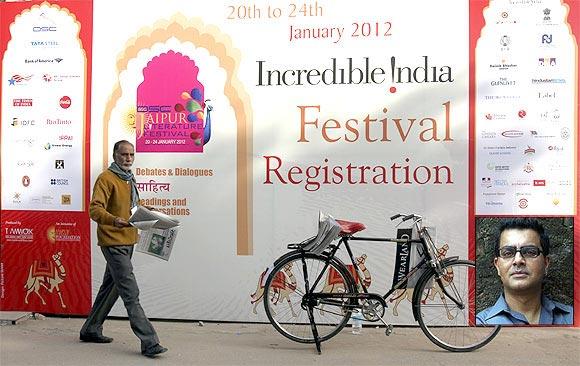
Writer Amitava Kumar tells Aseem Chhabra about life after he read from The Satanic Verses at the Jaipur Literary Festival.
Last week Amitava Kumar -- the New York -based writer and professor of English at Vassar College, was in India, visiting the Jaipur Literature Festival.
Kumar and British novelist Hari Kunzru learned that Salman Rushdie had been advised not to attend the festival because of threats to his life. So the duo decided to dedicate a session reading passages from and discussing Rushdie's book The Satanic Verses, which has been banned in India since the winter of 1988.
The reading of the passages became a media circus, and Kumar and Kunzru were advised to leave the festival and India.
After his return, Kumar spoke to Aseem Chhabra from his home in New York about his experiences in India.
Amitava, when did you get back?
On Tuesday (January 24). On Monday I was sitting at Delhi airport eating kadhai paneer and parathas, because I was very happy that I had gotten through immigration. A part of me thought that someone would stop me.
You stayed back in India for a couple of days. Hari Kunzru tweeted that he was already out of India. It took you a little longer to get out.
It wasn't easy for me to get a ticket immediately.
When did you reach India for the festival and when was your first session?
I reached on January 16 and I was in Jaipur on the 18th. My first session was on Friday on the front lawns of the Diggi Palace with Michael Ondaatje.
The issue of whether Salman Rushdie was coming or not was up in the air, but what did you know at that point?
At that point it was just the controversy about Rushdie. But it was around lunch time when journalists came up to me and asked 'What is your response to the news that Salman Rushdie is definitely not coming?'
That was when the police released information that three hit men had been sent to kill Rushdie.
Please click Next to read the rest of the interview...
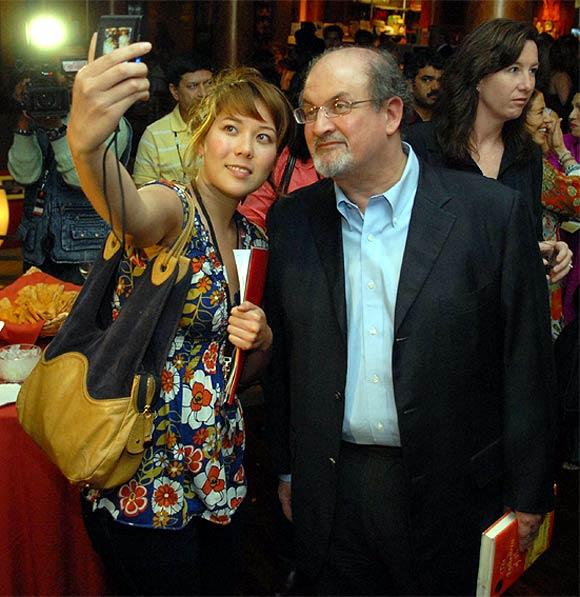
What was your response to the journalists?
I told them that I was disappointed. I also said, 'It is clear from Salman Rushdie's writing that politics and literature cannot be separated. Everything is political. But it is a rather shallow form of politics that is being played here. Literature and a literary festival cannot be segregated from the hurly-burly of politic. Rushdie's writings and his career are a testament to that.'
You had a session with Hari Kunzru later?
Yes, and Hari suggested that instead of talking about a lot of people in the desert -- which is what his book (Gods Without Men) is about, 'Let us talk about Salman.'
At that point I said, 'Yes, why don't we read from The Satanic Verses?'
There was a small office in the Diggi Palace (venue for the Jaipur Literature Festival). We went online and searched for The Satanic Verses and the whole text was there.
I typed in the word 'doubt' in the search and found the passage that Hari read.
I then searched for the word 'writer,' since I was looking for something on a writer. Baal, one of the characters in The Satanic Verses is a writer. I did not find a suitable passage. Then I looked for the passage which I find funny about Gibreel Farishta transforming London into a tropical city.
Sitting in that same office I sent out a tweet that we were going to do this. Hari retweeted it and then sent another one saying that this was in response to the bigots.
I went up on stage and said, 'We were still going to talk about gods and men, but there had been a change in the cast of characters. We will talk about Salman Rushdie and the politicians who have made it difficult for him to come to India. We will do it as an act of solidarity with Rushdie who has been denied entry into India by the forces of violence.' And the audience cheered.
How many people were there?
The hall was packed and outside the session was being broadcast on giant screens.
After I made the announcement Hari made a small statement, then he read his piece about doubt and then it was my turn.
At that point, one of the organisers came and politely said they had seen our tweets. He said, 'If you are going to read from the book, you must stop now, otherwise the festival will be shut down, because the police is on its way.'
Please click Next to read the rest of the interview...
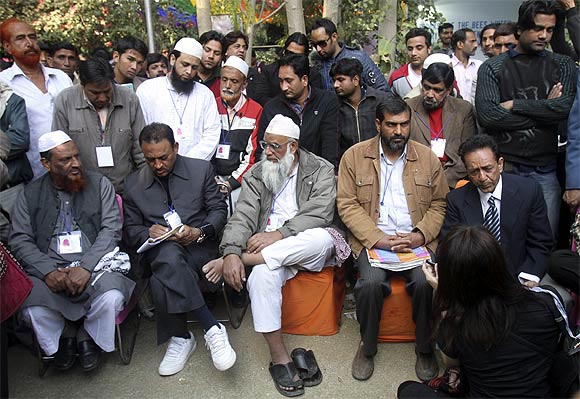
Did the Jaipur police actually read your tweets?
No, a CNN-IBN reporter read my tweet and had broadcast it. Regional television had reported it. It happened very fast.
I then told the audience what the organisers were saying. I said they were good people and had provided us with this important forum. So many writers and so many people were there. It was a wonderful thing. But then I added that I was going to read anyway.
It was such a funny piece. Everyone enjoyed it. I really didn't think I was breaking the law. That was not my concern. And I knew I was not offending anyone by reading that piece. I was celebrating the written word.
I even said that Mr Rushdie and I have had differences, but at that point I was standing for a writer's right to have his words read, without the threat of being killed.
I also talked to Hari about the influence of Rushdie and other writers on his work. It was a wonderful discussion.
After each session we writers were taken to an area where they sign books. At that time I was suddenly asked questions by Hindi-speaking reporters. I was asked 'Are you not guilty of provoking religious violence?'
It was my first moment of fear. I had the first realisation that this was beyond our control, that whatever you may want to do, people will portray it as something else.
The writer will write in his or her words, but the readers, even when they are not reading you, will take it elsewhere entirely.
One of the volunteers at the festival grabbed my arm and said 'Sir, you have to come with me.' And she took me to the writers' lounge. I think Hari was also accosted by the media people, because when he came in, he looked utterly shaken. This was late evening.
The press had become very aggressive. Someone called my agents in London and in India. My Indian agent called me to ask what was happening. My wife received a call early in the morning in New York.
The police came. They were very courteous. They seemed relieved that we had not read from the book, but from a printout. It was then that we learned that two other writers had also read from the book.
Jeet (Thayil) and Ruchir (Joshi) came in and we drank scotch.
We then met with the festival's lawyer -- Akhil Sibal -- who said, 'The festival will be shut down. We will have to appear at court hearings for years.'
Hari and I had an invitation to a party hosted by Penguin India at Amber Fort. Hari was a bit optimistic to make it, but I wasn't, because the press was waiting for us outside.
I did go out later to get food and then took the shuttle to our hotel. We were asked to sign a statement that we took responsibility for what we had done.
At 1 am, the festival's travel agent had booked us on an early morning flight to Delhi. The next morning, as we were leaving, the flight attendants were looking out at what they thought was the gleaming private jet of Oprah Winfrey.
Please click Next to read the rest of the interview...
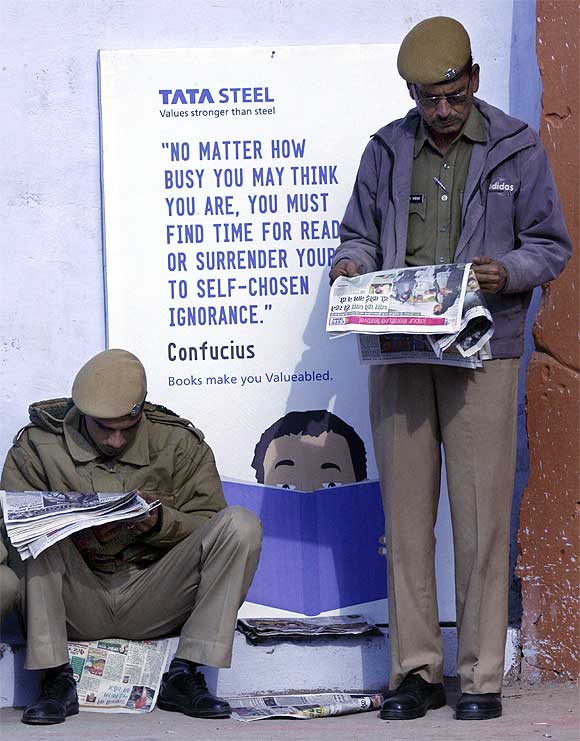
Did anyone recognise you?
Yes, in the plane I was recognised. Our pictures were on the front page of every newspaper. One lady asked, 'So you were able to get out?'
And the flight attendant asked me if I wanted a second box of sandwiches.
You reached Delhi on Saturday afternoon? You were at that point looking for a ticket to get out of India?
Yes, I was. My wife was very anxious for me to leave, because she had seen some television footage including that of a Member of Parliament saying that the four of us should be prosecuted in the courts.
When did you learn about the law suits?
I heard about it on Sunday from Sanjoy Roy (one of the festival organisers) after I asked him what the status was. But there was great support from writers and friends on Facebook and Twitter.
Arundhati Roy's lawyer Vrinda Grover -- a woman I have never met before, talked to me and said I could call her at anytime for advice. I was getting media requests, but she advised me not to respond. She wanted me to take care of myself.
You spent two days in Delhi. Was there any stress or tension?
I wrote on The New York Times blog (India Ink) that there is a moment in some Hindi films when a man pleads with his killer, 'I have small children.'
But the next morning I went and spoke to Ashis Nandy, Shuddhabrata Sengupta of Raqs Media Collective, documentary filmmaker Rahul Roy.
I knew the cases would be filed on Monday and there was the fear that if the police had been intolerant I could be stopped at the airport.
No one recognised you at the airport?
Vrinda Grover said for that to happen, the police would have to be extraordinarily efficient.
I saw Arundhati on the way to the airport and she said: 'Relax boss, have some more beer.' And she said, 'I'll be ashamed of you if your pulse rises.'
Please click Next to read the rest of the interview...
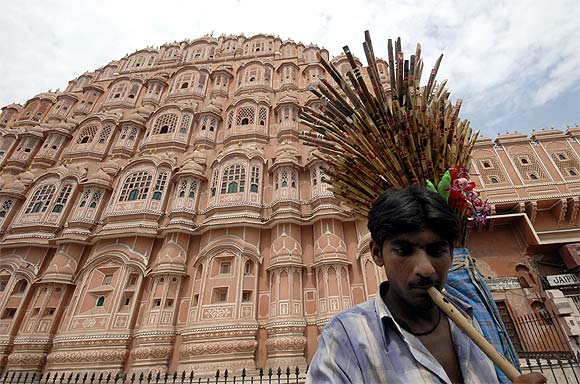
Have you had any conversation with Salman Rushdie?
He was very generous. He sent me more than one direct message on Twitter, thanking me for my gesture, support, and solidarity.
I know you have had some differences with Mr Rushdie, but have you had any other contact?
No, in fact, we have never met. But because of him being on Twitter, I feel like I have been in dialogue with him.
When I arrived at Newark and I tweeted that I had landed, I got another message from Rushdie, informing me that it was not against the law in India to read from the book.
Have you had any communication with the courts in India?
The hearing is on February 2 and the festival's lawyers will handle it.
Perhaps until then you cannot visit India, how do you feel about that?
I have old parents. I would be devastated if, due to any complications from this case, I am not able to visit India.
I can understand that, but you are relieved to be home?
My children are happy that I can take them to school. But this is what I said on Twitter: 'I had to leave India to be safe. A realisation filled with surpassing loss.'
So what do you make of all it?
When I went to see Ashis Nandy, I asked him this question. He said 'Ours is not a democracy, it is psephocracy.' This means that electoral votes determine everything. So that is quite obvious in this case.
It just struck me that extremist Hindus put me on a 'black list' after I had written a piece called Marriage For Peace during the Kargil War.
And now right-wing extremist Muslims are unhappy with the fact that I have dared to read from Salman Rushdie's The Satanic Verses.
Outlook Editor-in-Chief Vinod Mehta said on television that the readings by the four of you were orchestrated by Rushdie.
How ridiculous is that?
I am staggered by this assumption. On the one hand you have the views of the conservatives, the extremists and the fundamentalists, but what do we do when the more educated believe so?
But I also believe it is a writer and a writer's word that can stir up. We should recognise that.
Nilanjana Roy wrote a piece where she said the only difference between Chetan Bhagat and Salman Rushdie -- the reason why we should pay attention to Rushdie, is that Chetan Bhagat has never offended anyone. That's an entitlement of a writer. That is the most disturbing thing about Chetan Bhagat.
More people will want to read Rushdie in India, perhaps download The Satanic Verses.
My niece, who is 18, said following these events she had been inspired to read The Satanic Verses. She is reading it now.